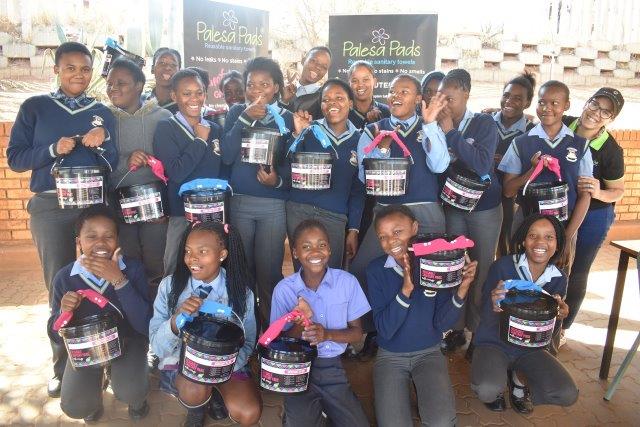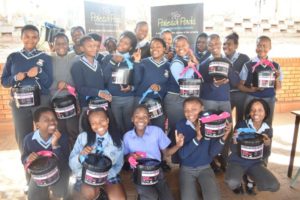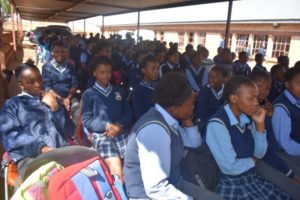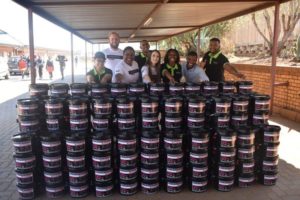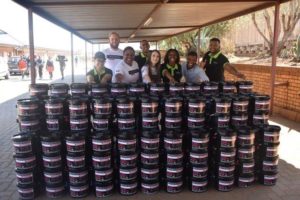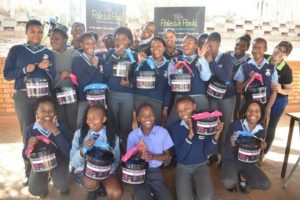Silverstar changes girls’ lives in Krugersdorp with donation of reusable pads
Silverstar Casino has positively impacted 652 school girls’ lives with a donation of reusable sanitary protection products at Thathulwazi WR High School in Krugersdorp in October, as part of its education-focused and community caring initiatives, and in recognition of the International Day of the Girl Child.
Elizabeth Wesi in Grade 11, who is wheelchair-bound, was one of the thrilled recipients. “Palesa pads will change my life. Everything will be easier because there is no cost and my family will save money. I use to get burns because of sitting too long in my chair, and changing my pads was difficult. With Palesa pads, everything will be better.”
The reusable Palesa Pads Starter Flo Kits that have been donated to all the girls at the high school from grades 8-12, are valued at R250 each. Each kit contains six pads, cleaning materials to wash the pads, and a bucket.
Anneke Potgieter, Silverstar’s Operations Director and Complex GM, says the donation will help to ensure that the girls will not have to miss school during their menstrual cycles due to limited or no access to sanitary products. “Last year Stellenbosch Law Clinic released research that showed that 30% of South African girls miss school every month because they cannot afford sanitary products.”
She adds that with Silverstar’s consistent focus on education aimed at ensuring the chance of a brighter future for young South Africans, investing close on R200,000 in reusable sanitary protection kits should make a difference to the girls’ school attendance, on disposable income within the households (a year’s supply of sanitary products can cost up to R2,200), as well as on the environment because used disposable sanitary products will not be thrown in rubbish dumps or landfills. “Having an effective and manageable system will also contribute towards the girls’ dignity and self-worth, which can go a long way towards boosting their positive outlook on the future.”
Pearl Jofile, Thathulwazi’s Life Orientation Educator, explains that their community is very poor, and several orphaned and vulnerable children attend the school. “Our students are from low income families and the girls would sometimes miss school because parents can’t afford pads. This gap will be closed by the Palesa pads because they no longer need to stay home because they have no sanitary protection, which means that their school performance will improve. On a monthly basis, the school has been providing pads from the Department of Social Development for a few girls in the schools, but sometimes the neediest girls are omitted because only 180 of the girls could be assisted. Also, sometimes the pads would arrive late and the girls would go without. We appreciate the difference these Palesa pads will make to our learners. If the girls take care of their new Palesa pads, they should last a long time.”
Linking the Palesa Pads handover to the International Day of the Girl Child adds further emphasis to the importance of girl children being placed on an equal footing with boys in every aspect of life. UNICEF’s International Day of the Girl Child is commemorated annually around the world on October 11 to highlight the many ways that gender inequality impacts young girls and their access to fundamental human rights. This year’s theme is ‘GirlForce: Unscripted and Unstoppable’ to celebrate the achievements made by girls since the 1995 adoption of the Beijing Declaration, a policy agenda for women’s empowerment.
The handover sessions to the different grades at the high school entailed educational workshops, instructions on product usage, as well as entertainment to keep the girls engaged and happy.
Selemetso Kaami in Grade 11, says, “Palesa pads will change my life. My mother has three girls so she will now have one less monthly sanitary pad expense for three years. I didn’t always have sanitary towels and had to resolve to alternative means. With Palesa pads I know that I am covered.”
Reusable and washable pads are becoming increasingly popular because they are:
- Environmentally friendly – it can take more than 500 years for one sanitary pad to decompose, but a washable reusable pad can last up to five years.
- Cost friendly – about R50 per year for reusable pads.
- Available – there are always reusable sanitary products in the home.
- Easy to wash and reuse.
- Comfortable – clip onto panties and remain in place.
- Pretty – Palesa Pads have a full waterproof layer and a pretty printed fabric.
- Create jobs – Palesa pads are made by South Africans, providing employment.
Omphemetsi Plaaitjies, Owner and Director of Palesa Pads SA, had been researching alternatives to disposable sanitary pads when she came across reusable sanitary towels being manufactured in Germiston. “This was a new concept in SA. I got in touch, bought a kit for myself and was amazed at how easy the product was to use. A month later I went back to the factory and proposed a partnership. My aim is to make sure that every girl in SA gets a kit. There are health benefits, financial benefits and environmental benefits in using this product, which contributes to developing SA into a more sustainable country.”
Get Social:
Be the first to know the latest Silverstar news on Facebook @SilverstarZA or follow us on Twitter @SilverstarZA #LoveSilverstar

